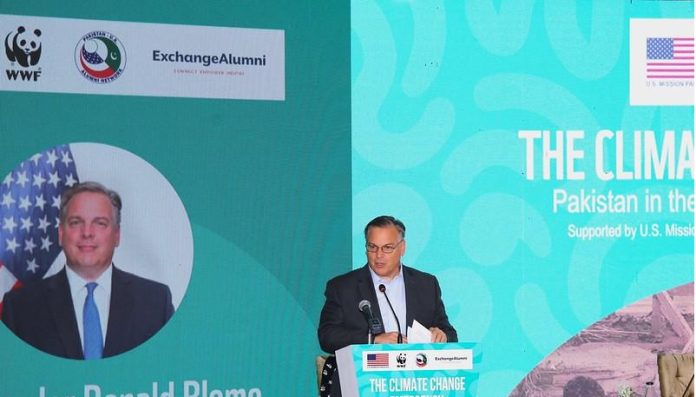ISLAMABAD, Aug 05 (Alliance News): United States Ambassador, Donald Blome on Saturday said the U.S.-Pakistan Green Alliance Initiative was a critical component of the States global contribution towards the goal of addressing climate change.
The U.S. envoy was addressing the Pakistan U.S. Alumni Network’s (PUAN) two-day conference on “The Climate Change Emergency: Pakistan in the 21st Century and the Road to COP-28” here which was jointly organised by the PUAN and WWF-Pakistan.
U.S. Ambassador Blome welcomed the PUAN national conference participants and said that such conferences only got successful if the right people were addressing the issue in an important manner.
He informed that participants that there were some 14 chapters of PUAN functional in different countries and all it’s members were selected due to their innovative skills. Over 800 nationals were selected due to their commitment to address climate change, he added.
Ambassador Blome said it was a complex international issue that required expertise and critical financial solutions.
The PUAN, he said represents diversity of scientists, students, experts and journalists who were actively engaged in their fields.
All 14 PUAN chapters had completed all of their projects aimed at addressing climate change, he added.
He urged the PUAN alumni to support and advance U.S.-Pakistan Green Alliance across Pakistan. He said the Alliance envisioned the history of U.S. support to Pakistan’s green revolution in 1960 and it’s hydropower schemes at that time which helped in revolutionizing it’s agriculture sector.
He mentioned that the U.S. was supporting agriculture innovation, climate smart agriculture, renewable energy transformation and climate advocacy and others.
The Green Alliance, he said provided Pakistan a tremendous opportunity to explore new opportunities in the private sector for augmenting it’s climate resilience.
He mentioned that the U.S. was supporting Pakistan’s Lahore University of Management Sciences (LUMS)’s initiative of electric vehicles (EV) production project to help develop Pakistan it’s indigenous production capacity to achieve it’s ambitious target of converting it’s 30% vehicles over EVs by 2030.
The Ambassador informed that his team had developed many key collaborations between the U.S. and Pakistani universities in multidisciplinary domains.
It was also helping in providing startup grants to support their out-of-the-box solutions and innovations providing solutions to climate-induced disasters.
Earlier, Country Director PUAN, Sahibzada Aamir Khalil in his opening remarks welcomed the guests and the participants at the forum.
Climate Change, he said was no longer a dissenting threat but a reality.
He said the forums like PUAN were striving for a sustainable future for the coming generations as climate change incurred damages to all sectors from food security, biohelath to biodiversity.
“Let us seize this opportunity to reimagine our societies with environmental stewardship at it’s core. Let’s need to work hand in hand for climate change emergency with the commitment it demands,” he said.
Director General, Worldwide Fund for Nature (WWF-Pakistan) Hammad Naqi Khan in his keynote address said the Fund have been continuously advocating that climate crisis was a national crisis in Pakistan.
Pakistan, he said is at the top of the most vulnerable countries and it was a flood plain area that always experienced floods.
He reiterated the words of the UN Secretary General saying, “The Monsoon on steroids happened in 2022 as from hill torrents in the north to rainfall of biblical proportion in the south plains left millions of people devastated and livestock killed.”
After that, he said in COP-27, Egypt loss and damage fund was pleaded which was around $60 billion to assist the developing countries worst impacted due to climate catastrophes.
“Pakistan is not the last country facing climate stress as it will reach every country. The heatwaves in the States after Pakistan prove the fact. July is the hottest month ever recorded in the history of this planet. Global warming has changed into global boiling after such temperature rise,” he said.
Pakistan is among the few countries having climate change ministry whereas a Climate Change unit has to be at the center of every ministry and department because everybody was suffering of it, he said.
He mentioned that Pakistan had multiple natural disasters from floods to forest fires and droughts to glacial melt, adding, “It’s important to build that capacity to face those challenges”.
The Green Climate Fund (GCF) with the help of USAID approved $70 million for Recharge Pakistan project which would promote nature based solutions in conserving floodwater and reviving depleting aquifers, he added.
“We need support as climate change needs a collective action. The US Educational Foundation and PUAN are the policy and decision makers that should have this vision at the core of their interventions. It’s possibile only by making efforts together,” Khan said.
Later, the U.S. Ambassador held a brief press talk to apprise the media on PUAN and WWF-Pakistan jointly held two-day Climate Change conference.
Ambassador Blome said almost 120 Pakistan-US Alumni Network (PUAN) participants were present at the conference on Climate Change.
The alumni network comprised of different people belonging from various backgrounds who were committed to find solutions to climate change through innovation, creative solutions and technology.
US-Pakistan Green Alliance was investing millions of dollars in climate smart agriculture, green energy transition initiatives and various other interventions focussing on climate resilience, he added.
The PUAN is full of dedicated volunteers that are committed to the cause of climate change, he added.
Private sector innovation, he said was important and the US Embassy was working with many startups especially the one working on locally made EVs, and climate smart agriculture.
“I have also visited U.S.-Pakistan advance energy set ups being established with the cooperation of USAID. I also visited the U.S.-Pakistan Water Research Center at Hyderabad. We capitalized the largest GCF funding through the collaboration of Coca-cola and WWF,” he said.


